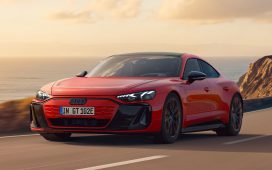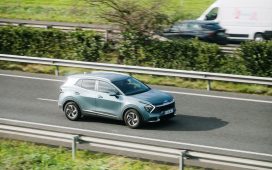Plug-in vehicles drove the biggest growth in car ownership since 2016 to take the number of vehicles on UK roads to a record high last year.
That’s according to new Motorparc data published yesterday (Apr 20) by the SMMT, which said there were 41,404,589 vehicles driving around last year – an increase of 1.7%. In 2016, the growth was 2.5%.
The total number of cars on the road rose by 1.6% – 546,800 units – to 35,694,845, after almost half a million new battery-electric (BEV) and plug-in hybrid (PHEV) vehicles were registered during 2023, comprising 314,687 BEVs and 141,311 PHEVs.
The number of BEVs in use rose by almost half (47.3%) versus 2022, which the SMMT said meant that zero-emission vehicles now accounted for 2.7% of all cars in use – up from just 1.9% in 2022.
And despite the record number of motors on the road, the amount of CO2 produced by the average car dropped by 2.1%. The total CO2 emissions for 2023 was 132.1 g/km, while the previous year’s figure was 135.0 g/km;
Meanwhile, company car emissions plummeted by 11.5%, thanks to what the SMMT called ‘compelling fiscal incentives’ that encouraged fleets to invest in EVs, as well as investment by manufacturers.
The mean CO2 emission figure for company cars last year was 103.3 g/km versus 116.7 g/km in 2022.
The industry body said that giving private consumers similar incentives to switch would help decarbonise UK road transport dramatically.
And the SMMT said that manufacturers were able to better meet robust pent-up demand since the industry had now largely recovered from the supply chain challenges that badly hit deliveries following the pandemic.
British motorists are also keeping their cars for longer – the average car on the road is now nine years old, with the average age of a car now up by more than a year since 2019.
That was evidenced by the now-discontinued Ford Fiesta ranking as the most popular car of 2023, with 1,487,925 of them on the roads.
The top five accounted for more than 5.3m in use last year and saw the Vauxhall Corsa in second place at 1,050,579, Ford Focus third at 1,049,818, Volkswagen Golf fourth at 1,004,152 and Vauxhall Astra fifth with 715,647.
Record numbers of commercial vehicles are now in use, with 625,873 HGVs and 5,012,632 vans in operation – up by 1.7% and 2.6% respectively.
Zero-emission workhorses also recorded a boost – with BEV van volumes rising by 43.5% on 2022 to 61,161, meaning 1.2% of vans on UK roads are now zero-emission.
The number of electric buses in operation also grew – up by 159.4% to 1,922 units, making the UK Europe’s biggest market for zero-emission buses and coaches.
But the SMMT pointed out that despite a record year of registrations in 2023, the UK’s public transport fleet shrank to its lowest level since records began at 71,239 vehicles.
To hammer home the need for greater investment in this sector, the SMMT said that one in five buses in use is now more than 18 years old.
However, while overall EV use continues to grow, with 1,602,334 plug-in cars, vans, trucks and buses in operation, public chargepoint rollout is still lagging, said the trade body.
Last year was the best one for public chargepoint rollout, but the SMMT said there was still just one standard public charger available for every 35 plug-in cars on the road – in January this year, there were 43,559 slow/fast chargers – which was slight improvement from the one for every 36 last year.
The situation is even more challenging for commercial vehicles, with no clear national plan for van-specific chargepoints, and just one dedicated public truck charging location for the entire country, the SMMT said.
And it stressed that the ZEV mandate, which came into force at the beginning of this year, meant the time to invest in infrastructure is now.
It added that the investment needed to be nationwide so that everyone – irrespective of vehicle type, location and accessibility – can access a reliable, convenient and affordable charging network.
SMMT chief executive Mike Hawes said: ‘After two challenging years of constrained supply, more people and businesses across the UK are now getting back behind the wheel – and increasingly, opting for greener options.
‘However, given the ageing fleet, we now need to encourage consumers and businesses who have deferred purchases of new cars, vans, trucks and buses to upgrade.
‘A stronger and stable economy, coupled with reduced living costs, would boost consumer and business confidence, while compelling fiscal incentives would ensure that these purchases are emissions-free.
‘Not only would this accelerate the transition – fundamental to the UK’s net zero ambitions – but it would also stimulate the economy and enhance the wider environment in which we all live.’
- Ford Fiesta – 1,487,925
- Vauxhall Corsa – 1,050,579
- Ford Focus – 1,049,818
- Volkswagen Golf – 1,004,152
- Vauxhall Astra – 715,647
- Volkswagen Polo – 711,583
- Mini – 707,575
- Nissan Qashqai – 672,125
- Toyota Yaris – 527,749
- BMW 3 Series – 519,858
Source: SMMT













